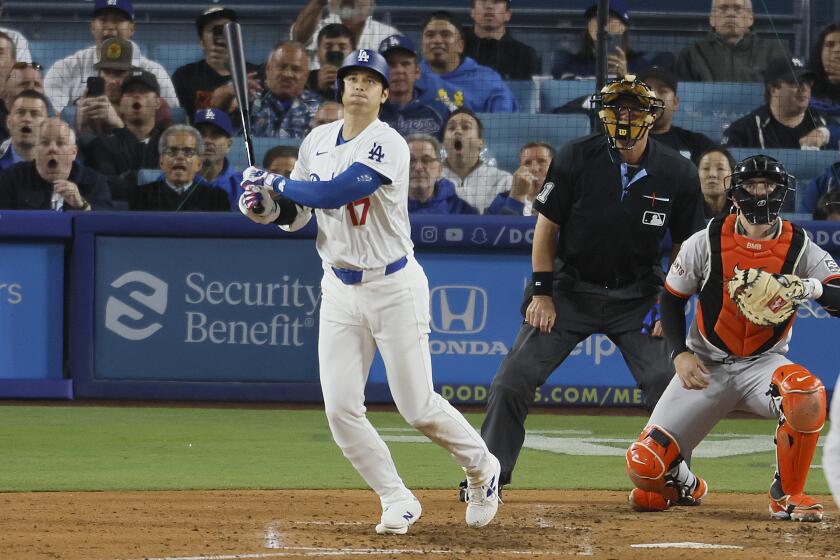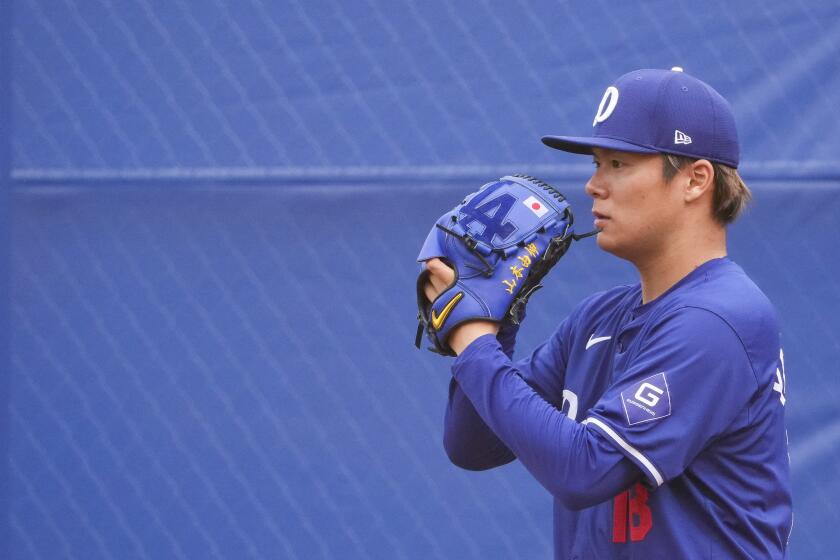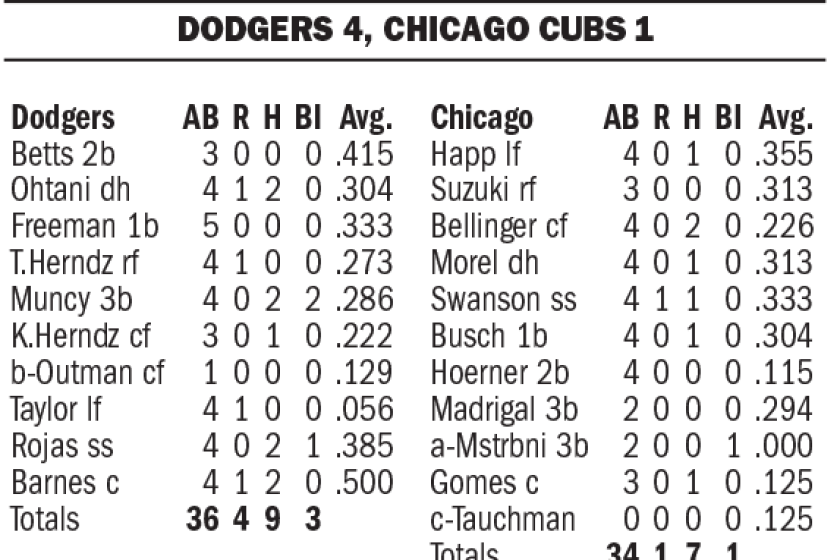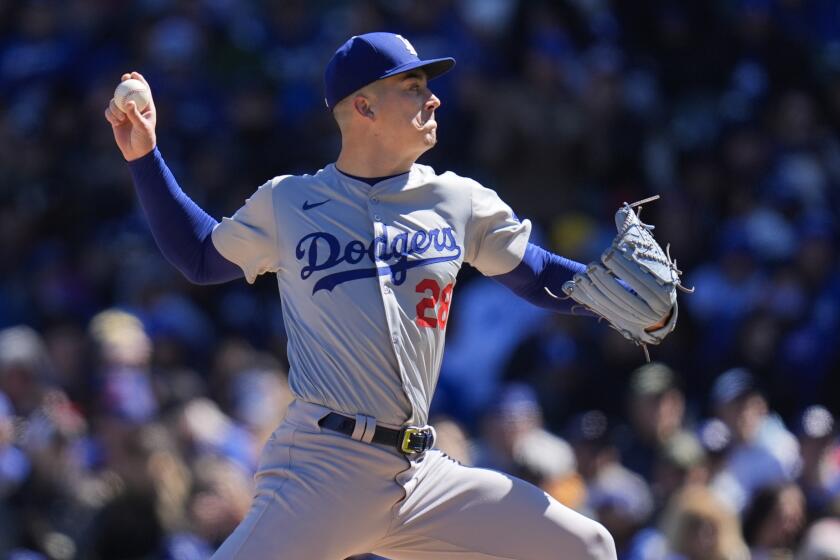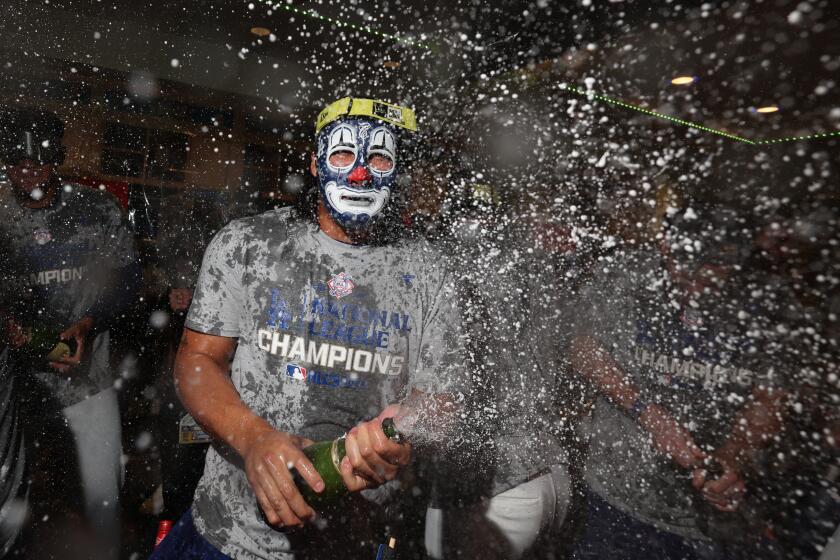Inside Yoshinobu Yamamoto’s MLB transition, which continued in Dodgers’ win over Cubs
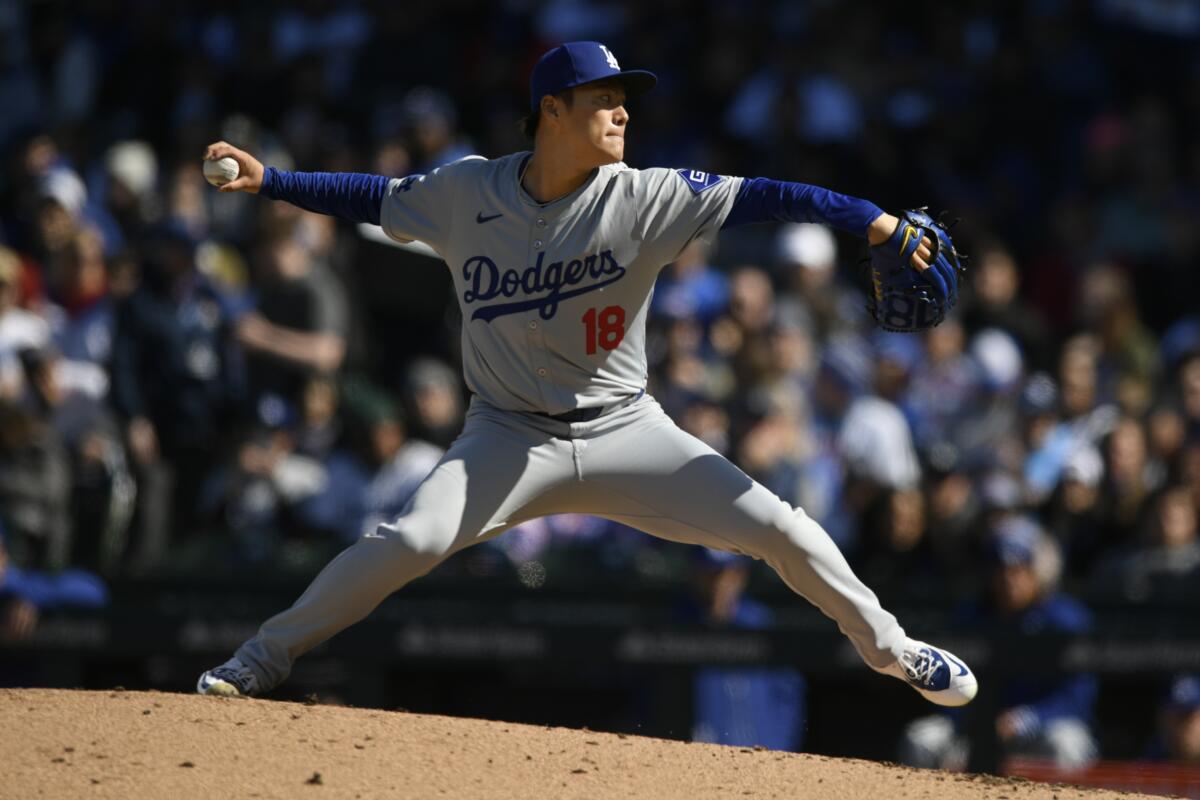
CHICAGO — In his first taste of the major leagues, Yoshinobu Yamamoto crumbled.
But on Saturday at Wrigley Field, staring down the barrel of a couple of early bases-loaded jams, the young star Japanese pitcher coolly, calmly and confidently refused to cave.
After signing his record-breaking $325 million contract this offseason — the largest in MLB history for a pitcher not named Shohei Ohtani — Yamamoto’s transition to the big leagues wasn’t exactly seamless.
When coupled with all of the other challenges that come with uprooting one’s life and moving to a foreign country 6,000 miles away, Yamamoto didn’t always look settled.
Some days, he wore a nervous expression in front of reporters. Others, he simply seemed out-of-sync on the mound.
Ambar Roman and her husband felt pressured by the Dodgers to give up the Shohei Ohtani home run ball she caught. ‘I feel like the Dodgers took advantage of us.’
Some evaluators around the industry started wondering how long it might take for him to fully adjust to his new team, league and surroundings with the Dodgers.
Internally, concern among Dodgers officials never spiked. But their high-priced acquisition wasn’t looking as advertised, either.
“The ultimate goal right now is to just get him comfortable,” assistant pitching coach Connor McGuiness said last week. “Get him the right routine.”
Two starts later, both boxes appear to be checked.
After spinning five scoreless innings at Chavez Ravine last weekend, Yamamoto did the same Saturday’s against the Chicago Cubs, striking out eight batters while leaving six others stranded in the Dodgers’ eventual 4-1 win.
If the first outing was a sigh of relief for the organization, the latter was something much more meaningful — a rousing reminder of why they invested more than $375 million (when including Yamamoto’s posting fee) to lock him up for the next 12 years.
The roots of Yoshinobu Yamamoto’s success? The choice to defy convention and be willing to adapt even at an early stage of his career with the Orix Buffaloes.
“He just didn’t want a repeat of Seoul,” manager Dave Roberts said proudly postgame, contrasting Saturday’s effort with the five-run, one-inning dud Yamamoto endured in South Korea to start his rookie season. “You could see it.”
In the top of the first, the Cubs’ three leadoff hitters reached on a double, walk and ground-ball single on the infield. Thirteen pitches into the game, pitching coach Mark Prior (and interpreter Will Ireton) were already out for a mound visit.
But then, in an alternate ending to Yamamoto’s implosion in Korea, the 25-year-old right-hander dug deep, and started racking up outs.
Christopher Morel was the first victim, waving at three Yamamoto curveballs Roberts described pregame as being “as good as any right-handed curveball” he can remember (Clayton Kershaw is still the king of left-handed curves, the manager noted with a grin).
Dansby Swanson went down next, even after working a 3-and-0 count. He whiffed on two center-cut fastballs that exploded through the zone. Then, he took a third straight 97-mph heater that was painted on the inside black.

When the inning ended on a called strikeout — this time, Michael Busch went down looking on a generously called outside curveball — Yamamoto didn’t offer much reaction, other than a brief, instinctual scream as he walked off the rubber.
When the script repeated itself an inning later — the Cubs loaded the bases with two outs in the second on a double, walk and error by Max Muncy, only to strand them all again on another curveball Yamamoto grooved for a called third strike — the pitcher was even more understated.
One quick glare back toward the plate. A casual stroll returning to the dugout. Then, nine more consecutive outs to finish his 80-pitch display.
“Just with how those first couple innings started, to be able to get him through five innings … was big,” Roberts said, noting that Yamamoto was on a rough 85-pitch limit after failing to surpass 70 in his first two appearances. “Just being mindful of that, I thought he was fantastic.”
Thanks to a three-run rally from the Dodgers in the fifth — Muncy followed a run-scoring wild pitch with a two-run single off the right-field wall — Yamamoto checked another box Saturday, earning his first win as a major league pitcher.
The honor appeared as significant to him as it was to his teammates, who summoned Yamamoto into a closed-off clubhouse for several minutes postgame for a ceremonial beer (along with other unknown liquids) shower.
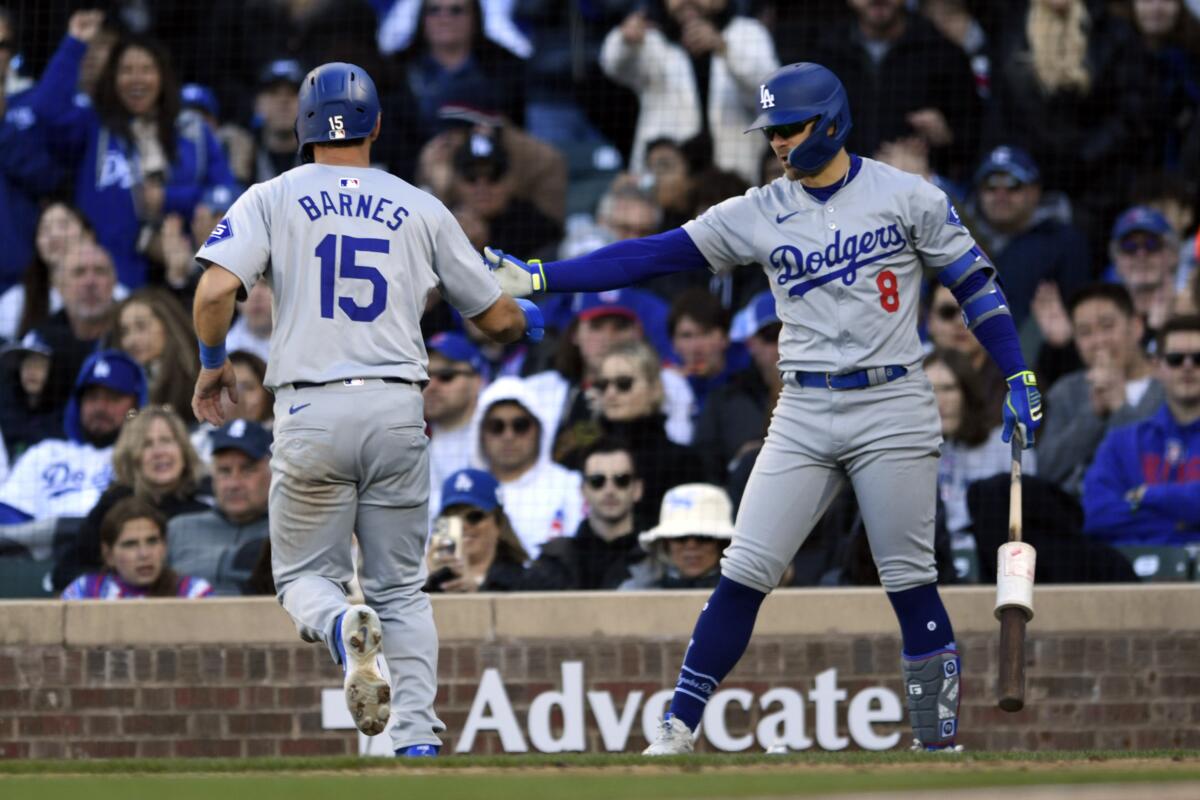
“I heard a rumor,” Yamamoto said with a smile when asked if he knew the celebration was coming.
“No comment,” Muncy joked when asked exactly what the Dodgers poured on their new Japanese teammate.
Early in spring camp, it was Dodgers players who initially flagged an issue with Yamamoto’s delivery -- noticing that, for all the other deceptive traits of his atypical mechanics, there were times he seemed to be tipping his pitches.
From the stretch, Yamamoto would move his glove up and slightly away from his body. From that position, players told McGuiness, it was easy to identify when he went to certain pitch grips — especially his splitter.
Dodgers infielders alerted the club’s pitching coaches directly. The team’s own SportsNet LA broadcast highlighted it during one of his spring training starts.
“There was a little bit of fear that you could possibly see a few things,” McGuiness said. “So he had to try some different glove positions.”
In hopes of fixing one problem, however, other “self-inflicted” side effects, as Roberts described them last week, suddenly surfaced.
During his start in South Korea, Yamamoto kept his glove low against his hip while throwing from the stretch. Pitch tipping was no longer a concern. But the timing of his sophisticated mechanics — which include some nimble footwork, a full extension of his throwing arm, then a violent whipping motion that allows even his 5-foot-10 frame to generate above-average velocity — got all out of whack.
“I think that stance directly connects to the transferring of weight,” Yamamoto said in Japanese last week. “I felt things were just a little bit off.”
The San Diego Padres made Yamamoto pay in his MLB debut, knocking him around mercilessly in a 43-pitch inning. And coming off an inauspicious 8.38 ERA in Cactus League play, other seemingly minor issues — such as a lack of feel for his wipeout splitter, wild command with his pinpoint fastball and inability to generate enough strikes with his curveball — quickly felt like they were beginning to mount.
“It wasn’t good in South Korea,” Roberts acknowledged Saturday.
But, the manager added, “he just came back and went to work.”
Indeed, over the last two weeks, Yamamoto has erased much of that initial doubt.
In his home debut against the St. Louis Cardinals, Yamamoto returned to a more familiar version of his set-glove position — with the mitt still up and away from his body, but angled in a way to keep the ball more concealed — and then picked apart the opposition, allowing only two of 17 batters to reach base safely despite a rain delay.
“When he gets his feet under him, I think he’ll be one of the best pitchers in this game,” Barnes said.
The start of Saturday’s appearance, meanwhile, showed the mental fortitude and high-pressure composure that Yamamoto, crucially, possesses as well.
“That’s what everyone expected when you talk about the kind of contract that he got,” Muncy said. “It’s been really really fun to watch. Especially that first inning, he didn’t get off to the best start. But then he battled back, showed a lot of heart and fought through it. It was electric from there on out.”
In the Dodgers’ 9-7 loss to the Cubs, Bobby Miller failed to get through the second inning, giving up five runs in a 43-pitch frame.
So impressed by Yamamoto’s behind-the-scenes process even before Saturday’s gem, Roberts called the pitcher an “artist” and a “craftsmen” during his pregame address with reporters.
“I think it’s who he is,” Roberts said. “He takes it very seriously.”
Later, as he sat back in his office chair following the team’s seventh victory in their last nine games, the manager then used another descriptor to explain what he had watched — not just Saturday, but for the better part of the last month.
“There’s just a lot of fight, great competitor,” Roberts said. “[He] was easy to bet on once we cleaned up the delivery again.”
Short hops
The Dodgers acquired pitcher Connor Brogdon from the Philadelphia Phillies for minor league pitcher Benony Robles on Saturday. They also recalled reliever Gus Varland from the minors and designated Dinelson Lamet for assignment.
More to Read
Are you a true-blue fan?
Get our Dodgers Dugout newsletter for insights, news and much more.
You may occasionally receive promotional content from the Los Angeles Times.

